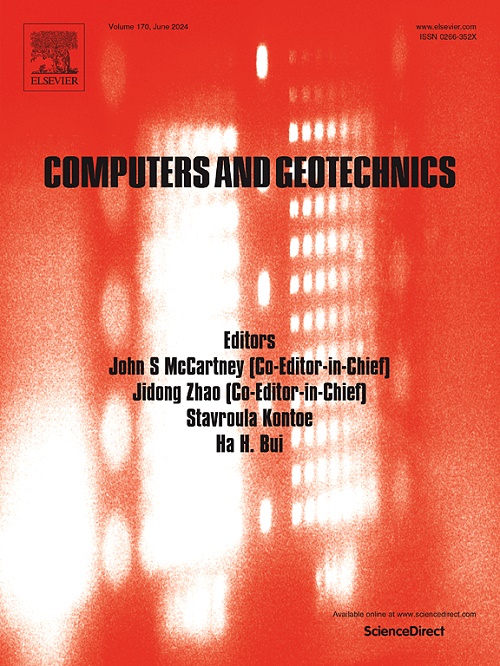Torsional dynamic response of rigid footings and pile foundations for various end-conditions
IF 5.3
1区 工程技术
Q1 COMPUTER SCIENCE, INTERDISCIPLINARY APPLICATIONS
引用次数: 0
Abstract
An analysis for torsional dynamic response of rigid footings and pile foundations with various end-conditions: half-space, soil stratum, and end-bearing is demonstrated. The interaction adjacent to footing/pile is simulated through the Vlasov-Leont′ev foundation model. Because of stress singularity at the pile/footing base, the end-conditions (half-space and soil stratum) at the foundation base are incorporated in the boundary conditions of the analysis through expressions in literature. The expressions are obtained from the torsional dynamic response of a rigid disk welded to the surface of the viscoelastic media. Several expressions, from various formulations, are employed, and the degree of accuracy of each expression is assessed through an extensive comparative study with rigorous and simplified solutions in the literature. The expression that is most accurate and captures the mechanics of the interaction problem in a half-space/soil stratum is extracted and proposed. The accuracy of the Vlasov-Leont′ev foundation model is also assessed for end-bearing pile foundations. For each end-condition, parametric studies are also performed for a wide range of frequencies, and pile-slenderness and stiffness ratios, and appropriate conclusions derived from the studies are reported. Comparisons with experimental results are shown to demonstrate the applicability of the analysis to geotechnical engineering practice.
各种端部条件下刚性基脚和桩基的扭转动态响应
对刚性基脚和桩基的扭转动力响应进行了分析,其端部条件各不相同:半空间、土层和端部承载。通过 Vlasov-Leont′ev 地基模型模拟了邻近基脚/桩的相互作用。由于桩基/基脚基底存在应力奇异性,因此通过文献中的表达式将基底的端部条件(半空间和土层)纳入分析的边界条件中。这些表达式是从焊接在粘弹性介质表面的刚性圆盘的扭转动态响应中获得的。通过与文献中的严格解法和简化解法进行广泛的比较研究,评估了每个表达式的准确程度。提取并提出了最准确、最能反映半空间/土层中相互作用力学问题的表达式。此外,还评估了 Vlasov-Leont′ev 地基模型对端承式桩基的准确性。对于每种端部条件,还针对各种频率、桩斜度和刚度比进行了参数研究,并报告了研究得出的适当结论。报告还显示了与实验结果的比较,以证明该分析适用于岩土工程实践。
本文章由计算机程序翻译,如有差异,请以英文原文为准。
求助全文
约1分钟内获得全文
求助全文
来源期刊

Computers and Geotechnics
地学-地球科学综合
CiteScore
9.10
自引率
15.10%
发文量
438
审稿时长
45 days
期刊介绍:
The use of computers is firmly established in geotechnical engineering and continues to grow rapidly in both engineering practice and academe. The development of advanced numerical techniques and constitutive modeling, in conjunction with rapid developments in computer hardware, enables problems to be tackled that were unthinkable even a few years ago. Computers and Geotechnics provides an up-to-date reference for engineers and researchers engaged in computer aided analysis and research in geotechnical engineering. The journal is intended for an expeditious dissemination of advanced computer applications across a broad range of geotechnical topics. Contributions on advances in numerical algorithms, computer implementation of new constitutive models and probabilistic methods are especially encouraged.
 求助内容:
求助内容: 应助结果提醒方式:
应助结果提醒方式:


